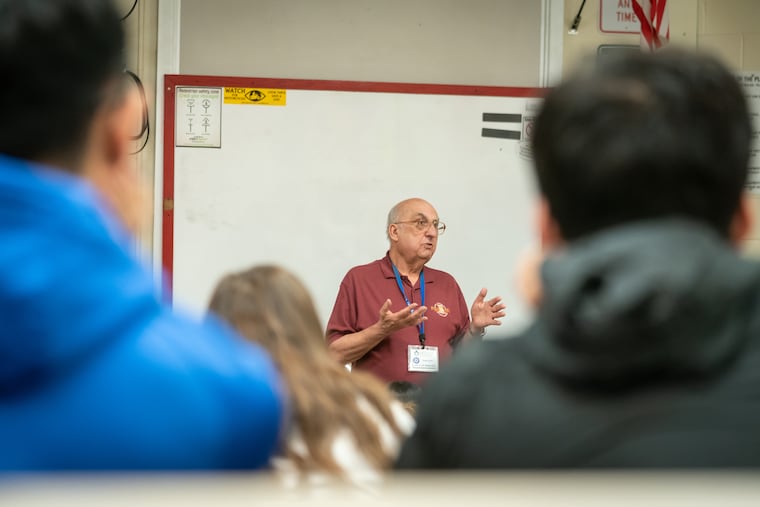‘I didn’t want him to die’: How a South Jersey man keeps his son’s memory alive by promoting organ donor awareness
More than 5,000 people in the Philadelphia region are on the list awaiting organ transplants. These Gift of Life volunteers try to promote awareness about the need.

Since their 16-year-old son, Curtis, was killed while riding his bike on Route 70 in Cherry Hill 35 years ago, Tom and Vivian Gano have been on a mission to share their decision to donate his organs — each for different reasons.
She wanted to spare other families awaiting an organ transplant the pain of losing a child. He wanted to keep alive the memory of his fun-loving middle son, who was a Boy Scout and loved football. So the couple became volunteer ambassadors for the Gift of Life to promote organ-donor awareness.
The South Jersey couple has crisscrossed the region, sharing their son’s story with about 290,000 students and talking about their decision to donate his organs when doctors at Cooper Hospital in Camden declared Curtis brain-dead two days after he was struck by a van on July 6, 1987.
“I never thought I’d have to make that decision for my children,” said Tom Gano, 80, a retired IT specialist, choking back tears. “You don’t bury your children.”
» READ MORE: Marcia R. Cohen, one of the world’s oldest liver transplant recipients, dies at 94
They prayed at his bedside, hoping for a miracle. Tom Gano knew after the first tests that the likely outcome was bleak. Shortly before Curtis was pronounced dead, the Cherry Hill couple agreed to donate his organs, which saved four lives and helped others through tissue donation. His liver was donated for research.
”I just didn’t want anyone to feel what I was feeling if something could be done to save their life,” said Vivian Gano, 75, a retired teaching assistant. “It helped to know that someone could be saved and Curtis didn’t die in vain.”
The family underwent counseling and joined a self-help group for bereaved parents and siblings, Compassionate Friends. They found solace and support from others who had experienced their sense of loss.
Eventually, the couple made their way back to Cooper Hospital around 1989 for an organ donor program, where they were reunited with the trauma nurse, Bill, who treated their son. They shared their story and that ignited their passion to advocate for organ and tissue donation.
Tom Gano organized a local group of other donor families, living donors, and recipients, and with his wife, began visiting high schools in New Jersey, Pennsylvania, and Delaware. Before the pandemic, he scheduled more than 170 days of school talks annually.
“He’s like the energizer bunny volunteer,” said Richard Hasz, president and CEO of the Gift of Life. “His service to the donor program has been incomparable. It’s amazing.”
Gano was recognized in 2012 as outstanding volunteer by United Network for Organ Sharing, or UNOS, a private, nonprofit organization that manages the U.S. organ transplantation system.
As schools have returned to some normal operations and started allowing visitors inside, Gano has resumed a busy schedule. He expects to reach 300,000 students by December. He typically speaks to health and physical education classes.
Last week Gano was at Cherry Hill East High School, where Curtis was a sophomore when he died, and spoke during six periods to seniors in teacher Ken Smith’s health classes — a talk he’s been doing there for about 25 years.
He methodically shared information about the Gift of Life program and organ procurement, who can donate, and what organs can be donated. Because most of the students are 18, he explained how they could become organ donors by checking a box on their driver’s license.
Gano usually brings along a donor recipient to meet students so they can see the impact, but many are immunocompromised and have been reluctant to go to schools since the pandemic.
» READ MORE: Lung transplants encouraging treatment for COVID-19 patients, but long-term outcomes still uncertain
Often, the statistics, which he displays on a screen, are sobering enough: More than 105,00 adults and children are on the national transplant waiting list, the majority needing kidneys. Every day, 17 people die while waiting for an organ transplant.
In the Philadelphia region, about 5,000 people are on the transplant list, some waiting for more than five years. Every nine minutes another person is added to the transplant waiting list.
Sitting theater-style in a large classroom at East, the students intently watched his presentation. About half in each class said they were already registered donors. A few knew someone who had received an organ transplant.
Smith said hearing the information has been an eye-opener for students, who also learn about organ donation during driver education class as sophomores.
”They think they’re invincible,” Smith said. “It’s the farthest thing from their minds.”
Standing in front of each class for nearly an hour, Gano patiently answered questions.
“Is there an age limit?” one student asked. No, Gano replied.
“Can you still have a funeral?” another asked. Yes, he reassured the student.
Another student wanted to know, “What’s the downside?”
Gano responded with candor and a gentle smile: “You’re dead.”
His wife, who occasionally accompanies him and typically tells Curtis’ story, was absent this day, but in an interview she described her son as a caring child who made friends easily. He enjoyed playing Atari video games and Dungeons & Dragons. He was an acolyte at their Lutheran church and was considering becoming a minister or an engineer.
Curtis’ heart and lungs went to a 53-year-old man, one kidney was transplanted to a recipient at the University of Pennsylvania, and the other went to a 17-year-old boy from South Jersey. His pancreas went to a 45-year-old man. His tissues and cornea were also donated.
“I wanted to keep as much of him alive as possible,” Gano said.